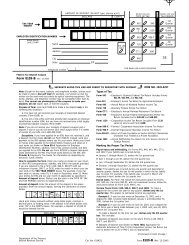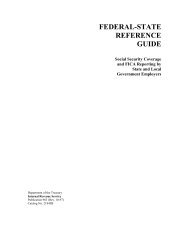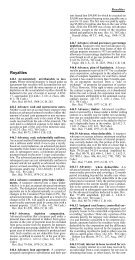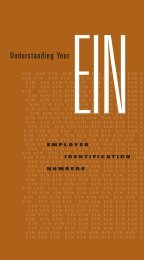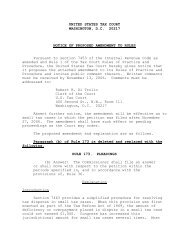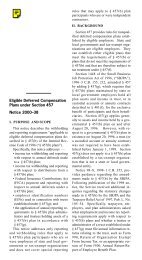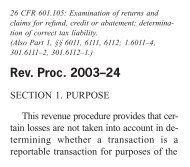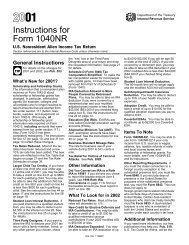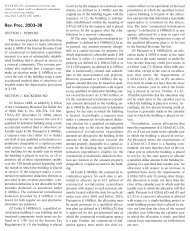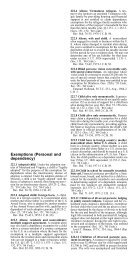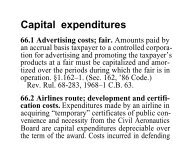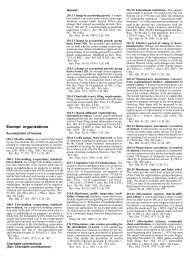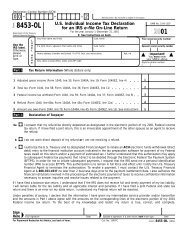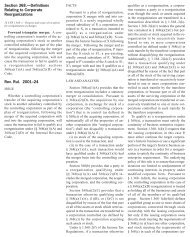Auto Dealerships - Audit Technique Guide - Uncle Fed's Tax*Board
Auto Dealerships - Audit Technique Guide - Uncle Fed's Tax*Board
Auto Dealerships - Audit Technique Guide - Uncle Fed's Tax*Board
Create successful ePaper yourself
Turn your PDF publications into a flip-book with our unique Google optimized e-Paper software.
elatively small. Through reinsurance, the insurance company becomes less vulnerable to the<br />
adverse trend. The primary insurance company remains obligated to the consumer; the<br />
reinsurer is obligated to the primary insurer. Thus, risk is diversified.<br />
2. Expand client base<br />
Policyholder surplus is the equity capital that may be invested by the insurance company<br />
shareholders, plus unappropriated retained earnings. Surplus in an insurance company is<br />
similar to shareholders equity in a corporation.<br />
The surplus serves as a backup to the reserves in case losses are greater than anticipated.<br />
Failure to maintain adequate surplus can inhibit future growth because there are insufficient<br />
funds for future policies to be written. Generally, a specific amount of surplus must be<br />
maintained for each insurance contract written.<br />
Reinsurance is used by insurance companies to address a need for additional surplus to write<br />
future policies by allowing the first insurer to shift liabilities off its balance sheet and onto the<br />
reinsurers balance sheet. Reinsuring credit life and credit accident and health contracts, even<br />
with related party reinsurers, is a common practice in the insurance industry.<br />
One reason that can be argued by the reinsuring auto dealer, is the reinsurance arrangement<br />
allows the dealer to increase the commission of the insurer. By funneling ceded contracts to<br />
the reinsurance company, the dealer’s net commission is increased above state caps when the<br />
contracts earn out and the dealer may have access to these reserves.<br />
Applying traditional insurance standards to these arrangements may lead to the conclusion<br />
that this is reinsurance in form, not substance. The arrangements do not achieve the usual<br />
benefits associated with reinsurance, namely risk distribution and surplus relief. The only<br />
recognized benefit that this arrangement produces is to increase commission income originally<br />
capped by state statutes.<br />
The Future<br />
As we analyze the facets of dealer Aftersale Financial Products, we see that we have encountered<br />
changes emerging that may establish a formula to apply to future analysis of true insurance<br />
situations. We have seen the law evolve, from Humana, to the point where, as in the Ocean<br />
Drilling case, outside risk and true insurance were determined to exist where 27 percent of sales<br />
were to non-related parties. See Ocean Drilling, Inc. v. Commissioner, 24 Cl. Ct. 714 (1991).<br />
Consider also the Malone & Hyde, Inc. decision discussed, above, in Chapter 12 of this <strong>Guide</strong>,<br />
which distinguishes the Humana decision. See Malone & Hyde, Inc., 62 F.3d 835.<br />
Will the dealer aftersale financial products issue go away now that Rev. Procs. 92-97 and 92-98<br />
are in effect? In some cases this may be true. Remember, these revenue procedures only apply to<br />
mechanical breakdown contracts for which the dealership purchases an insurance policy from an<br />
unrelated third party to insure its obligations under the contract. As discussed throughout this<br />
13-13



